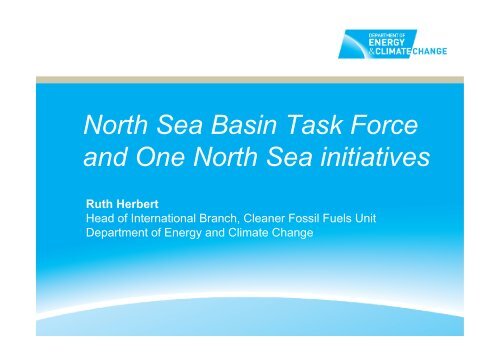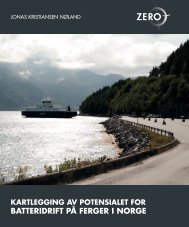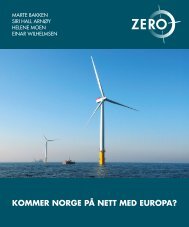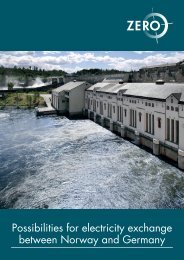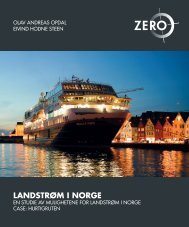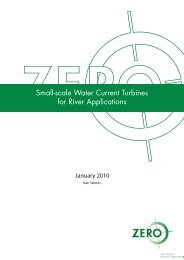North Sea Basin Task Force and One North Sea initiatives - Zero
North Sea Basin Task Force and One North Sea initiatives - Zero
North Sea Basin Task Force and One North Sea initiatives - Zero
You also want an ePaper? Increase the reach of your titles
YUMPU automatically turns print PDFs into web optimized ePapers that Google loves.
<strong>North</strong> <strong>Sea</strong> <strong>Basin</strong> <strong>Task</strong> <strong>Force</strong><br />
<strong>and</strong> <strong>One</strong> <strong>North</strong> <strong>Sea</strong> <strong>initiatives</strong><br />
Ruth Herbert<br />
Head of International Branch, Cleaner Fossil Fuels Unit<br />
Department of Energy <strong>and</strong> Climate Change
What is the <strong>North</strong> <strong>Sea</strong> <strong>Basin</strong><br />
<strong>Task</strong> <strong>Force</strong><br />
• Founded in 2005 by UK <strong>and</strong><br />
Norway to explore opportunities<br />
for cooperation on CO 2 storage<br />
in the <strong>North</strong> <strong>Sea</strong><br />
• In 2008 membership exp<strong>and</strong>ed<br />
to include Netherl<strong>and</strong>s <strong>and</strong><br />
Germany
<strong>Task</strong> <strong>Force</strong> activity 2005-2007<br />
• 2005 – ZERO<br />
promoted<br />
partnership between<br />
UK <strong>and</strong> Norway<br />
centred on Miller<br />
<strong>and</strong> Ecofisk.<br />
• 2007 – Report to the<br />
<strong>North</strong> <strong>Sea</strong> <strong>Basin</strong><br />
<strong>Task</strong> <strong>Force</strong><br />
examined phasing<br />
<strong>and</strong> clustering<br />
benefits in scenario<br />
modelling of CCS.
<strong>Task</strong> <strong>Force</strong> activity 2008-2009<br />
Work focussed on 3 key topics:<br />
•Risk assessment<br />
•Monitoring<br />
•Transboundary issues<br />
Key activities:<br />
• Inform EU Directive<br />
guidelines<br />
• Cooperation of National<br />
Geological Surveys<br />
• Project <strong>One</strong> <strong>North</strong> <strong>Sea</strong>
Issues faced by <strong>Task</strong> <strong>Force</strong><br />
Storage & Directive<br />
implementation<br />
What is the storage<br />
capacity<br />
Defining the<br />
appropriate risk<br />
management framework<br />
for storage sites<br />
Underst<strong>and</strong>ing the risks<br />
of onshore storage in<br />
saline aquifers<br />
Transfer of<br />
responsibilities for<br />
closed sites<br />
Pipeline transportation<br />
Coal<br />
Negative image of<br />
coal<br />
Predicted reliance on<br />
coal in medium term<br />
How far can we<br />
minimize the energy<br />
penalty of CCS<br />
Public awareness<br />
Huge challenges with<br />
public acceptance for<br />
new coal power<br />
Reservations about<br />
onshore CO 2<br />
storage<br />
(DE, NL)<br />
Why spend public<br />
money beyond R&D<br />
for demo projects
ONE NORTH SEA initiative
Objectives of ONE NORTH SEA<br />
(1)<br />
• Establish a clear vision of the potential role of<br />
the <strong>North</strong> <strong>Sea</strong> in the future deployment of CCS<br />
in Europe<br />
• What is the likely dem<strong>and</strong> for <strong>North</strong> <strong>Sea</strong> CO 2<br />
storage from the rest of Europe<br />
• How soon will this dem<strong>and</strong> appear<br />
• Where are the likely cross-border flows <strong>and</strong> what<br />
volumes are expected<br />
• What kind of factors is it dependent on
Driving forces for investments in CCS in<br />
European power sector (Econ, Pyry)<br />
Power dem<strong>and</strong><br />
Policy<br />
drivers<br />
EU 202020<br />
Renewables<br />
ETS regulations, including the emission cap<br />
Support to energy conservation<br />
Post Kyoto<br />
Global or regional solutions<br />
Transportation sector<br />
Market<br />
drivers<br />
GDP growth<br />
Fuel prices<br />
Investment <strong>and</strong> decommissioning<br />
R&D Investments<br />
Generation mix<br />
Carbon market<br />
Other incentives<br />
CCS costs<br />
Volume <strong>and</strong> structure in<br />
future CO2 emission<br />
Incentives to invest<br />
In CCS projects
Possible scenarios (Econ, Pyry)<br />
Accelerated cost reductions<br />
Preferred<br />
M<strong>and</strong>atory<br />
Global market driven<br />
CCS cost<br />
climate change policy regime<br />
Fragmented<br />
regulated<br />
<strong>and</strong> regional<br />
Competitive<br />
Fragile<br />
Modest cost reductions
Objectives of ONE NORTH SEA<br />
(2)<br />
• What policies <strong>and</strong> frameworks will need to be<br />
put in place to meet this projected dem<strong>and</strong><br />
• How should <strong>North</strong> <strong>Sea</strong> basin countries manage the<br />
predicted cross border CO2 flows<br />
• What are the key principles for cooperation<br />
• How can countries ensure they meet the<br />
requirements of the EU Storage Directive “jointly”<br />
• What is the next step, <strong>and</strong> how quickly must it be<br />
taken
UK view: Benefits of <strong>Task</strong> <strong>Force</strong><br />
• Work closely with stakeholders to develop<br />
methodologies to assist regulators on storage<br />
(Joint Government-Stakeholder meeting)<br />
• Share ideas <strong>and</strong> recent developments in an<br />
informal setting (Government-only meeting)<br />
• Strengthen underst<strong>and</strong>ing of each others’<br />
similarities <strong>and</strong> differences as countries<br />
• Develop stronger bilateral relations leading to other<br />
international <strong>initiatives</strong>, e.g. UK <strong>and</strong> Norway<br />
hosting CSLF Ministerial
Key messages from Carbon Sequestration<br />
Leadership Forum Ministerial Meeting<br />
20<br />
industrial-scale demo<br />
projects endorsed<br />
by G8 are vital<br />
more could be required in<br />
developed & developing countries<br />
by 2020<br />
CCS as a key mitigation<br />
technology recognised<br />
in appropriate international<br />
frameworks, including the United<br />
Nations Framework Convention on<br />
Climate Change<br />
Developed countries<br />
to assist developing<br />
countries achieve the level of<br />
CCS required.<br />
Support for a CSLF Capacity<br />
Building Program<br />
USD$3m<br />
donation so far<br />
12
Developments in UK policy<br />
• UK has already implemented requirements for<br />
carbon capture readiness to apply to all new<br />
gas, oil, biomass, waste-to-energy <strong>and</strong> coal<br />
power station applications above 300MW.<br />
• Government’s latest proposals are to:<br />
• Ensure no new coal power without CCS<br />
demonstration on a defined proportion of<br />
capacity from day one<br />
• Fund up to 4 large scale CCS<br />
demonstration plants


